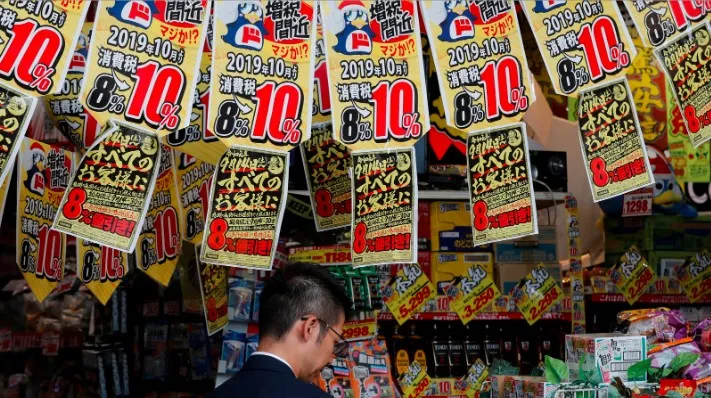简体中文
繁體中文
English
Pусский
日本語
ภาษาไทย
Tiếng Việt
Bahasa Indonesia
Español
हिन्दी
Filippiiniläinen
Français
Deutsch
Português
Türkçe
한국어
العربية
Japan's wholesale prices surge 7.3% in FY 2021, fastest pace on record
Abstract:The depreciation of the yen boosted import prices for Japan by 32.7 percent from a year earlier.
Japan's wholesale prices jumped 7.3 percent in the year to March 2022 from a year earlier, the fastest pace on record, driven by surging crude oil and commodity prices amid an economic recovery from the COVID-19 pandemic and Russia's invasion of Ukraine, Bank of Japan data showed Tuesday.
Amplified by a weak yen, the record rise since comparable data became available in 1981 came after a 1.4 percent fall in fiscal 2020. It highlighted the strong impact of fluctuations in commodity prices on Japan, a major energy importer.

The depreciation of the yen boosted import prices for Japan by 32.7 percent from a year earlier. The figure compared with a 12.3 percent rise in export prices. Both numbers are in yen terms.
In March alone, wholesale prices, or the price of goods traded between companies, rose 9.5 percent, marking the second fastest pace on record after a revised 9.7 percent gain in February. They were up for the 13th straight month, the BOJ data showed.
Surging crude oil and commodity prices, accelerated by supply concerns following the Russian aggression since late February, have maintained the upward pressure on prices.
Companies have been passing on the increased costs to consumers but they face a difficult balancing act in ensuring their profitability without hurting consumer demand.
With its powerful monetary easing helping to weaken the yen, the BOJ has come under growing pressure to convince corporate management and consumers of the need to leave its policy unchanged while its U.S. and European peers are moving toward policy normalization, a factor making the yen weaker.
The Japanese currency has slipped to a nearly seven-year low against the U.S. dollar.
“Higher commodity prices are pushing up wholesale prices,” a BOJ official said, adding that the crisis in Ukraine will likely have a continued impact on wholesale prices with a lag expected for some products.
Prices of many raw materials surged in fiscal 2021 when economic activity gradually recovered from the initial shock of the COVID-19 pandemic and commodity markets rebounded.
Petroleum and coal product prices soared 38.3 percent, lumber and wood products gained 44.0 percent. Nonferrous metals rose 30.5 percent, while scrap prices advanced 58.6 percent.
Despite the surge in wholesale prices, consumer inflation has not accelerated at a similar pace. BOJ Governor Haruhiko Kuroda has repeatedly expressed doubt about the sustainability of commodity inflation.
Higher raw material costs have already cooled sentiment among major Japanese companies ahead of the upper house election this summer, a key test for Prime Minister Fumio Kishida, with uncertainty looming over the war in Ukraine.
Toru Suehiro, a senior economist at Daiwa Securities Co., warned of the risk that companies may not be able to pass on higher costs as much as they would like to, as long as the economic recovery remains fragile.
“In that case, earnings will be hurt, slowing wage growth in an example of 'unwanted' inflation,” Suehiro said.
“Higher commodity prices and yen weakness both mean increased costs for consumers. The yen has been depreciating rapidly so pressure will grow (on the BOJ and the government) to do something about it,” he added.
In March, beverage and food prices rose 3.8 percent from a year earlier, marking the sharpest gain in over a decade.
Prices for a wide range of products rose, from petroleum and coal, and lumber and wood products to scrap, partly blamed on Russia's invasion of Ukraine.
Import prices advanced 33.4 percent while export prices increased 13.1 percent from a year earlier, both in yen terms.
Disclaimer:
The views in this article only represent the author's personal views, and do not constitute investment advice on this platform. This platform does not guarantee the accuracy, completeness and timeliness of the information in the article, and will not be liable for any loss caused by the use of or reliance on the information in the article.
Read more

Twin Scam Alert: Broker Capitals is a New Domain of Finex Stock
This week, the Italy financial regulator CONSOB issued a warning against an unlicensed broker named Broker Capitals. When we clicked on Broker Capitals' website, its logo, trade name, and design seemed familiar to us.

Berkshire CEO-designate Abel sells stake in energy company he led for $870 million
Berkshire Hathaway Inc said on Saturday that Vice Chairman Greg Abel, who is next in line to succeed billionaire Warren Buffett as chief executive, sold his 1% stake in the company’s Berkshire Hathaway Energy unit for $870 million.

Paying particular heed to payrolls
A look at the day ahead in markets from Alun John

Dollar extends gains against yen as big Fed hike bets ramp up
The dollar extended it best rally against the yen since mid-June on Monday, buoyed by higher Treasury yields after blockbuster U.S. jobs data lifted expectations for more aggressive Federal Reserve policy tightening.
WikiFX Broker
Latest News
What Makes Cross-Border Payments Easier Than Ever?
Trader Exposes Unethical Practices by STP Trading
Italian Regulator Warns Against 5 Websites
Currency Calculator


